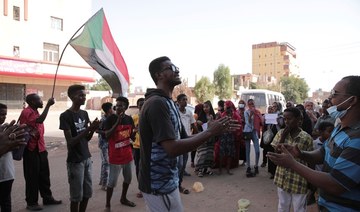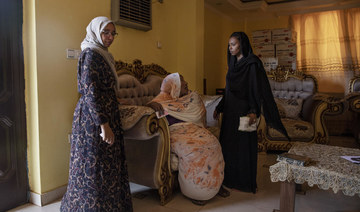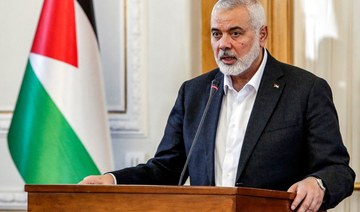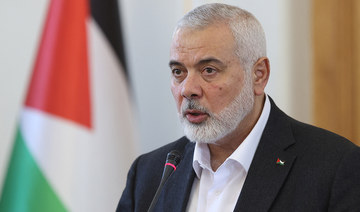GENEVA: The United Nations’ top human rights official on Friday condemned actions by military leaders in Sudan following a coup almost two weeks ago and called on them to “step back” to let civilian rule return.
UN High Commissioner for Human Rights Michelle Bachelet decried excessive use of force by security forces that has left at least 13 people dead and more than 300 injured since the coup. She also expressed concern about “numerous” arrests and disappearances of civil society and protest leaders, journalists, and activists.
Bachelet spoke during an urgent Human Rights Council session on Sudan. Britain, the United States, Germany and Norway led a push to commission an expert to monitor the situation in the African country.
The Human Rights Council debate took place while the UN still recognizes the ambassador from the deposed Sudanese government as the country’s official representative in Geneva. No representative from among Sudan’s top generals seemed to be attending the session.
“Events since the coup have recalled a somber page in the country’s history when freedom of expression was stifled and human rights were comprehensively repressed,” said Bachelet, in reference to the 30-year rule of Sudan by former autocrat Omar Al-Bashir.
“I urge Sudan’s military leaders, and their backers, to step back in order to allow the country to return to the path of progress toward institutional and legal reforms,” she added.
The Oct. 25 coup came more than two years after a popular uprising forced the military’s removal of Al-Bashir and his Islamist government in April 2019. It has upended the country’s fragile planned transition to democratic rule. Tens of thousands have taken to the street to protest since the takeover.
Massive anti-coup protests were in several instances met with excessive use of force, including use of live ammunition, as documented by the Joint UN Human Rights Office in Sudan, particularly in the capital, Khartoum, and the city of Omdurman.
According to medical sources, at least 13 civilians have been killed by military and security forces since Oct. 25, and more than 300 have been injured.
Sudan’s top general, Gen. Abdel-Fattah Burhan, and the forces loyal to him who dissolved Sudan’s transitional government and detained other government officials and political leaders, face increasing international pressure. Western nations have condemned the coup.
“Fundamentally, this is about respect for democracy and human rights,” Simon Manley, Britain’s ambassador in Geneva, said in a statement sent to The Associated Press. “I hope that fellow council members will stand in solidarity with the brave people of Sudan today.”
A draft resolution by the four Western countries presented earlier this week was considerably revised Friday. While the draft would have created a new, one-year post of a “special rapporteur” to monitor the situation, the final text asks Bachelet to appoint an expert to monitor the situation — until civilian rule is restored. The expert would work with her regional office in Khartoum and report back.
The resolution passed in the 47-member body without a vote.
The final text also jettisoned a call for immediate return to a civilian-led transitional government under Prime Minister Abdalla Hamdok, who was among those detained in the coup. Instead, it urges a “restoration of the civilian-led transitional government” without naming Hamdok, who is under house arrest but has been allowed to meet with UN and international diplomats as part of mediation efforts.
Many countries spoke out against the coup. But Russia and China, which often voice concerns about alleged international meddling in countries’ domestic affairs, took a different position. Chinese diplomat Li Song called for “constructive dialogue and cooperation” and cautioned that “external pressure will only complicate the situation.”
Russian representative Artur Chernyakov expressed Moscow’s opposition to the special session arranged mostly by the Western countries, calling it “a hasty decision. “
“Any interference in the internal affairs of that state is counterproductive and unacceptable,” Chernyakov said.
Inside Sudan, reports continue to emerge of new arrests of opposition figures.
The UN mission tasked with assisting Sudan’s transition to democracy on Friday condemned the arrest of three leaders from the Forces for Freedom and Change, a coalition that was born out of the 2019 protest movement.
In a statement, the mission said Taha Osman Isahaq, Sharif Mohamed Osman and Hamza Farouk were arrested near the mission’s headquarters in Khartoum on Thursday.
It said the new detentions were a step backward after reports that some officials held earlier would be released.
Sudan’s state-run news agency reported Thursday that Burhan had ordered the release of four government ministers who also were detained. A defense lawyer for the ministers said they had not yet been freed.
UN rights body holds urgent session in wake of Sudan coup
https://arab.news/2zyk3
UN rights body holds urgent session in wake of Sudan coup
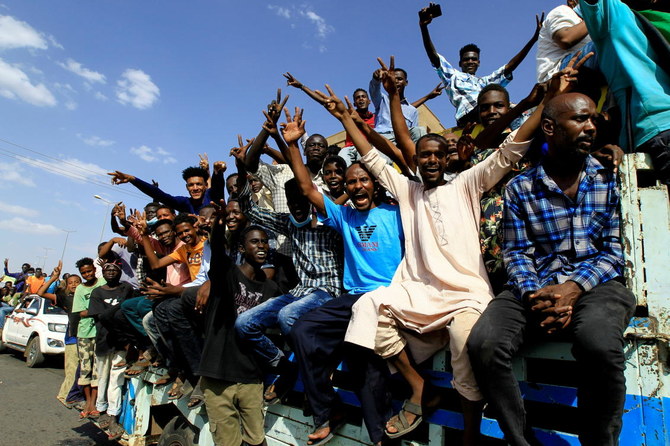
- UN High Commissioner for Human Rights decried excessive use of force by security forces that has left at least 13 people dead
- She expressed concern about “numerous” arrests and disappearances of civil society and protest leaders, journalists, and activists
Hamas chief Haniyeh arrives in Turkiye for talks
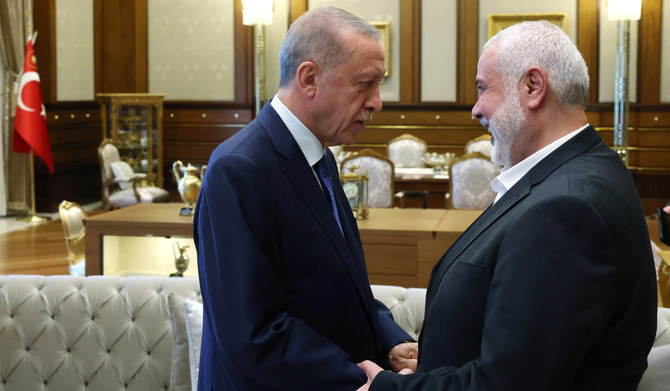
- Fidan said he spoke with Haniyeh, who lives in Qatar, about how Hamas — designated as a terrorist organization by Israel, the United States and the European Union — “must clearly express its expectations, especially about a two-state solution”
ISTANBUL: A leader of Palestinian militant group Hamas, Ismail Haniyeh, arrived in Istanbul Friday evening for talks with Turkish President Recep Tayyip Erdogan as the death toll in Gaza passed 34,000.
A statement from Hamas Friday said Erdogan and Haniyeh would discuss the conflict in Gaza, adding that the head of the group’s political bureau was accompanied by a delegation.
Middle East tensions are at a high after Israel’s reported attack on Iran and Gaza bracing for a new Israeli offensive.
Erdogan insisted on Wednesday that he would continue “to defend the Palestinian struggle and to be the voice of the oppressed Palestinian people.”
But talking to journalists on Friday, he refused to be drawn on the details on the meeting.
Turkish Foreign Minister Hakan Fidan was in Qatar Wednesday and said he spent three hours with Haniyeh and his aides for “a wide exchange of views in particular about negotiations for a ceasefire.”
Qatar, a mediator between Israel and Hamas, acknowledged Wednesday that negotiations to end hostilities in Gaza and liberate hostages were “stalling.”
Fidan said he spoke with Haniyeh, who lives in Qatar, about how Hamas — designated as a terrorist organization by Israel, the United States and the European Union — “must clearly express its expectations, especially about a two-state solution.”
Erdogan’s last meeting with Haniyeh was in July 2023 when Erdogan hosted him and Palestinian president Mahmud Abbas at the presidential palace in Ankara. Haniyeh had last met Fidan in Turkiye on January 2.
The war in Gaza started after Hamas’s unprecedented attack on Israel on October 7 that resulted in the deaths of about 1,170 people, mainly civilians, according to an AFP tally of official Israeli figures.
Militants also took about 250 hostages. Israel says around 129 are believed to be held in Gaza, including 34 presumed dead.
Israel’s retaliatory military campaign has killed at least 34,012 people, mostly women and children, according to Gaza’s Hamas-run health ministry.
Huge blast at military base used by Iraqi Popular Mobilization Forces, sources say

- PMF sources said the strikes targeted a headquarters of the PMF at the Kalso military base near the town of Iskandariya around 50 km south of Baghdad
BAGHDAD: A huge blast rocked a military base used by Iraq’s Popular Mobilization Forces (PMF) to the south of Baghdad late on Friday, two PMF and two security sources told Reuters.
The two security sources said the blast was a result of an unknown airstrike, which happened around midnight Friday.
The two PMF sources pointed out the strikes did not lead to casualties but caused material damage.
PMF sources said the strikes targeted a headquarters of the PMF at the Kalso military base near the town of Iskandariya around 50 km south of Baghdad.
Government officials did not immediately respond to a Reuters request for comment.
The PMF started out as a grouping of armed factions, many close to Iran, that was later recognized as a formal security force by Iraqi authorities.
Factions within the PMF took part in months of rocket and drone attacks on US forces in Iraq amid Israel’s Gaza campaign but ceased to do so in February.
Leaders of Jordan and Pakistan call UAE president to express concern about effects of severe storm

- Leaders passed on their best wishes to the country as it recovers from the storms
DUBAI: The president of the UAE, Sheikh Mohammed bin Zayed Al-Nahyan, received telephone calls from King Abdullah of Jordan and Pakistan’s Prime Minister Shehbaz Sharif on Friday, during which they expressed concern about the effects of the severe weather, including unusually heavy rainfall, that battered parts of the country this week.
They also passed on their best wishes to the country as it recovers from the storms and “conveyed their heartfelt hopes for the safety and prosperity of the UAE and its people, praying for their protection from any harm,” the Emirates News Agency reported.
Sheikh Mohammed thanked both leaders for their warm sentiments, and emphasized the strong bonds between the UAE and their nations.
The UAE and neighboring Oman were hit by unprecedented rainfall and flooding on Tuesday, with more than 250 millimeters of rain falling in parts of the Emirates, considerably more than is normally seen in a year. Dubai International Airport was forced to close temporarily when runways were flooded.
Peshmerga fighter dies in Turkish strike in north Iraq

JEDDAH: A member of the Kurdish Peshmerga security forces was killed on Friday in a Turkish drone strike in the autonomous Kurdistan region of northern Iraq.
Ankara regularly carries out ground and air operations in the region against positions of the outlawed PKK, the Kurdish separatist group that has waged a decades-long insurgency against the Turkish state.
The victim of Friday’s attack died in a drone strike on his vehicle, said Ihsan Chalabi, mayor of the mountainous Sidakan district near Iraq’s borders with Turkiye and Iran.
For decades, Turkiye has operated several dozen military bases in northern Iraq in its war against the PKK, which Ankara and its Western allies consider a terrorist group.
Both Baghdad and the Kurdish regional government have been accused of tolerating Turkiye’s military activities to preserve their close economic ties.
At the beginning of April, a man described as “high-ranking military official” from the PKK was killed in a Turkish drone strike on a car in the mountainous Sinjar region, according to the Kurdistan counterterrorism services.
Turkish President Recep Tayyip Erdogan is expected to visit Baghdad on Monday on his first official visit to Iraq since 2011.
Iraq’s Defense Minister Thabet Al-Abassi in March ruled out joint military operations against the PKK, but said that Turkiye and Iraq would “work to set up a joint intelligence coordination center.”
Middle East in ‘shadow of uncertainty due to regional conflicts’

WASHINGTON: Economies in the Middle East and North Africa face a “shadow of uncertainty” from ongoing tensions in the region, a senior IMF official said.
“We are in a context where the overall outlook is cast into shadows,” Jihad Azour, the International Monetary Fund’s director for the Middle East and Central Asia department, said in an interview in Washington.
“The shadow of uncertainty on the geopolitical side is an important one,” added Azour, a recent candidate for the next Lebanese president.
In the face of the ongoing conflicts in Gaza and Sudan and a recent cut to oil supplies by Gulf countries, the IMF has pared back its growth outlook for the Middle East and North Africa region once again.
FASTFACT
Economic activity in Gaza has ‘come to a standstill’ and the IMF estimates that economic output in the West Bank and Gaza contracted by six percent last year.
The IMF expects growth in MENA of 2.7 percent this year — 0.2 percentage points below its January forecast — before picking up again next year, the IMF said in its regional economic outlook report.
The risks to growth in the MENA region remain heightened, the IMF said, pointing to the danger of greater regional spillovers from the ongoing Israel-Gaza war.
“We have concerns about the immediate and lasting impact of conflict,” Azour said.
The IMF report said that economic activity in Gaza has “come to a standstill” and estimates that economic output in the West Bank and Gaza contracted by 6 percent last year.
The IMF said the report excludes economic projections for the West Bank and Gaza for the next five years “on account of the unusually high degree of uncertainty.”
The IMF cannot lend to the West Bank and Gaza because they are not IMF member countries.
However, Azour said it has provided the Palestinian Authority and the central bank with technical assistance during the current conflict.
“When we move into the reconstruction phase, we will be part of the international community support to the region,” he added.
Azour also discussed the situation in Sudan, where thousands have been killed in a civil war that has also devastated the economy, causing it to contract by almost 20 percent last year, according to the IMF.
“The country is barely functioning, institutions have been dismantled,” he said.
“And for an economy, for a country like Sudan, with all this potential, it’s important to stop the bleeding very quickly and move to a phase of reconstruction,” he added.
The recent Houthi attacks have particularly badly hit the Egyptian economy on Red Sea shipping, which caused trade through the Egypt-run Suez Canal to more than halve — depriving the country of a key source of foreign exchange.
Egypt reached an agreement last month to increase an existing IMF loan package from $3 billion to $8 billion after its central bank hiked interest rates and allowed the pound to plunge by nearly 40 percent.
A key pillar of the current IMF program is the privatization of Egypt’s state-owned enterprises, many of which are owned by or linked to the military.
“This is a priority for Egypt,” Azour said. Egypt needs to have a growing private sector and give space for the private sector to create more jobs.”
“We have an opportunity to re-engineer the state’s role, to give the state more responsibility as an enabler and less as a competitor,” he said.



